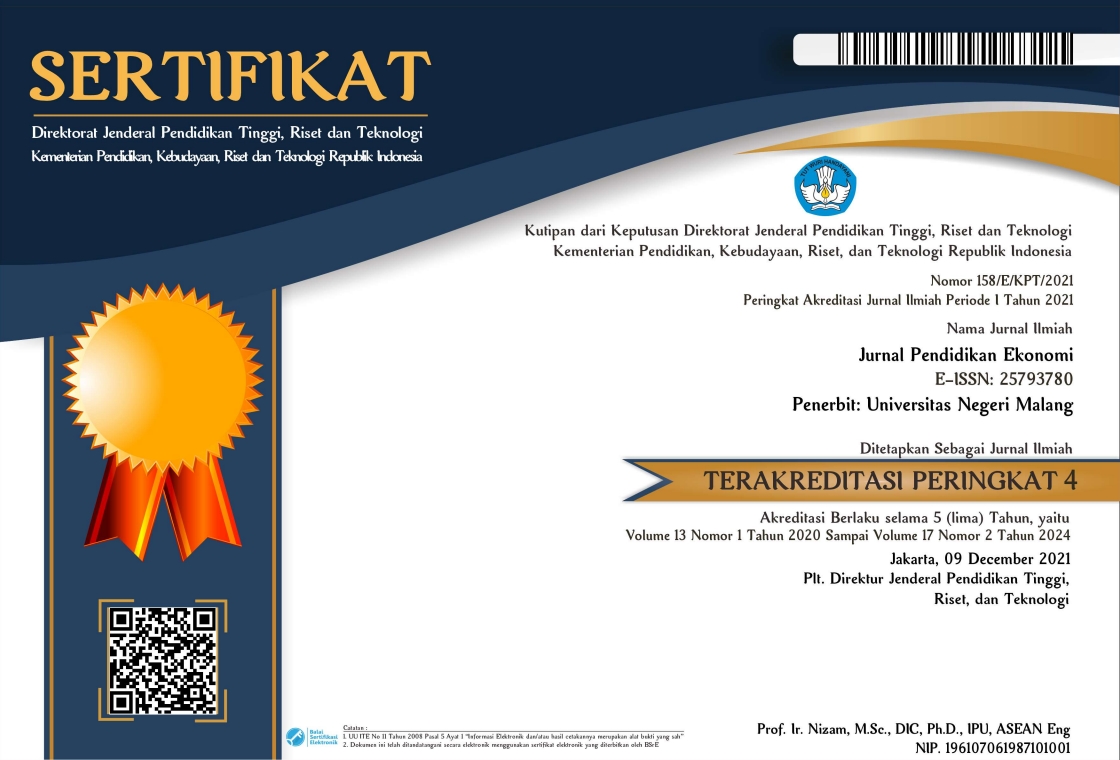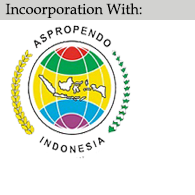Entrepreneurial Knowledge, Social Media, and Entrepreneurial Readiness: The Mediating Role of Entrepreneurial Mindset
Abstract
This present study aims to evaluate the influence of entrepreneurial knowledge, entrepreneurial mindset, and the use of social media on entrepreneurial readiness among university students. Primary data were obtained from 165 university students in Jakarta of Indonesia through an independent survey with an online questionnaire. Structural Equation Model Partial Least Square (PLS-SEM) techniques with Smart-PLS applications were used to analyze the retrieved data. The results indicate a positive and significant influence of entrepreneurial knowledge and entrepreneurial mindset toward entrepreneurial readiness among university students. This finding also reveals that the role of entrepreneurial mindset in mediating relationship between entrepreneurial knowledge and the social media usage on entrepreneurial readiness. The implication is that increasing understanding and entrepreneurial attitudes is crucial, while utilizing social media effectively as preparation for digital entrepreneurship. The variable of entrepreneurial knowledge plays an important role in providing the necessary understanding of the practical and theoretical steps in starting and managing a venture.
Keywords: entrepreneurial knowledge, mindset, social media, entrepreneurial readiness
Full Text:
PDFReferences
Adeniyi, A. O., Gamede, V., & Derera, E. (2024). Individual entrepreneurial orientation for entrepreneurial readiness. Humanities and Social Sciences Communications, 11(1). https://doi.org/10.1057/s41599-024-02728-9
Ahmed, E. R., Rahim, N. F. A., Alabdullah, T. T. Y., & Thottoli, M. M. (2019). An examination of social media role in entrepreneurial intention among accounting students: a SEM study. Journal of Modern Accounting and Auditing, 15(12), 577–589. https://doi.org/10.17265/1548-6583/2019.12.003
Badan Pusat Statistik. (2023). Jumlah dan persentase penduduk bekerja dan pengangguran. http://bps.go.id
Biesta, G. (2021). World-centred education: A view for the present. In World-Centred Education: A View for the Present (Issue June). https://doi.org/10.4324/9781003098331
Butar-Butar, A. D., Tinambunan, L. H. R., & Pratiwi, M. O. (2022). Pengaruh kesiapan wirausaha terhadap minat berwirausaha yang kreatif dan inovatif bagi generasi muda. Prosiding National Seminar on Accounting UKMC, 1(1), 1–8.
Cui, J., Sun, J., & Bell, R. (2021). The impact of entrepreneurship education on the entrepreneurial mindset of college students in China: The mediating role of inspiration and the role of educational attributes. International Journal of Management Education, 19(1). https://doi.org/10.1016/j.ijme.2019.04.001
Edeh, E., Lo, W.-J., & Khojasteh, J. (2023). Review of Partial Least Squares Structural Equation Modeling (PLS-SEM) Using R: A workbook. In Structural Equation Modeling: A Multidisciplinary Journal (Vol. 30, Issue 1). https://doi.org/10.1080/10705511.2022.2108813
Glewwe, P., Siameh, C., Sun, B., & Wisniewski, S. (2021). School resources and educational outcomes in developing countries. The Routledge Handbook of the Economics of Education, 218–252. https://doi.org/10.4324/9780429202520-10
Hair, J., & Alamer, A. (2022). Partial least squares structural equation modeling (PLS-SEM) in second language and education research: Guidelines using an applied example. Research Methods in Applied Linguistics, 1(3), 100027. https://doi.org/10.1016/j.rmal.2022.100027
Hamid, R. S., & Anwar, S. M. (2019). Structural equation modeling (SEM) berbasis varian: Konsep dasar dan aplikasi dengan program SmartPLS 3.2.8 dalam Riset Bisnis (Issue 1).
Huang, Y., Li, P., Bu, Y., & Zhao, G. (2023). What entrepreneurial ecosystem elements promote sustainable entrepreneurship?. Journal of Cleaner Production, 422, 138459.
Indriyani, R., & Suri, A. (2020). Pengaruh media sosial terhadap keputusan pembelian melalui motivasi konsumen pada produk fast fashion. Jurnal Manajemen Pemasaran, 14(1), 25–34. https://doi.org/10.9744/pemasaran.14.1.25-34
Irwan, & Adam, K. (2015). Metode partial least square (PLS) dan terapannya. Teknosains, 9(1), 53–68.
Jiatong, W., Murad, M., Bajun, F., Tufail, M. S., Mirza, F., & Rafiq, M. (2021). Impact of entrepreneurial education, mindset, and creativity on entrepreneurial intention: Mediating role of entrepreneurial self-efficacy. Frontiers in Psychology, 12(August). https://doi.org/10.3389/fpsyg.2021.724440
Karyaningsih, R. P. D., Wibowo, A., Saptono, A., & Narmaditya, B. S. (2020). Does entrepreneurial knowledge influence vocational students’ intention? Lessons from indonesia. Entrepreneurial Business and Economics Review, 8(4), 138–155. https://doi.org/10.15678/EBER.2020.080408
Katib, I. (2020). Leveraging social media analytics for enhanced healthcare (Doctoral dissertation, King Abdulaziz University Jeddah).
Moy, M. M., Cahyadi, E. R., & Anggraeni, E. (2020). The impact of social media on knowledge creation, innovation, and performance in small and medium enterprises. Indonesian Journal of Business and Entrepreneurship, 6(1), 23–31. https://doi.org/10.17358/ijbe.6.1.23
Mallios, P. I., & Moustakis, V. S. (2023). Social media impact on startup entrepreneurial intention: Evidence from Greece. International Journal of Industrial and Manufacturing Engineering, 17(12), 930–940.
Muhammad Idkhan, A., Idris, M., & Sunardi. (2018). The contribution knowledge of entrepreneurship self efficiency, and preparation of instrumentation to the entrepreneurial intension and its impact in entrepreneurial preparation. Journal of Physics: Conference Series, 1028(1). https://doi.org/10.1088/1742-6596/1028/1/012083
Musa, K. S., Maijama, R., National, N., Company, P., & Yakubu, M. (2019). Impact of population growth on unemployment in Nigeria: Dynamic OLS approach. Journal of Economics and Sustainable Development, February. https://doi.org/10.7176/jesd/10-22-09
Park, J. Y., Sung, C. S., & Im, I. (2017). Does social media use influence entrepreneurial opportunity? A review of its moderating role. Sustainability (Switzerland), 9(9), 1–16. https://doi.org/10.3390/su9091593
Paudel, K. P. (2019). Expectations and realities of knowledge management: experiences from higher education in developing countries. Education and Development, 29(January), 89–102. https://doi.org/10.3126/ed.v29i0.32574
Pham, M., Nguyen, A. T. T., Tran, D. T., Mai, T. T., & Nguyen, V. T. (2023). The impact of entrepreneurship knowledge on students'e-entrepreneurial intention formation and the moderating role of technological innovativeness. Journal of Innovation and Entrepreneurship, 12(1), 80.
Prayetno, S., & Ali, H. (2020). The influence of work motivation, entrepreneurship knowledge and advocate independence on advocate performance. International Journal of Innovation, Creativity and Change, 12(3), 147–164.
Rizki, M., & Keisha, D. S. (2022). The impact of corruption, inflation and unemployment towards poverty in Indonesia. Journal of Business Administration Economic & Entrepreneurship, 4(1), 47–56.
Rodriguez, S., & Lieber, H. (2020). Relationship between entrepreneurship education, entrepreneurial mindset, and career readiness in secondary students. Journal of Experiential Education, 43(3), 277–298. https://doi.org/10.1177/1053825920919462
Saadat, S., Aliakbari, A., Alizadeh Majd, A., & Bell, R. (2022). The effect of entrepreneurship education on graduate students’ entrepreneurial alertness and the mediating role of entrepreneurial mindset. Education and Training, 64(7), 892–909. https://doi.org/10.1108/ET-06-2021-0231
Sarstedt, M., & Cheah, J. H. (2019). Partial least squares structural equation modeling using SmartPLS: a software review. Journal of Marketing Analytics, 7(3), 196–202. https://doi.org/10.1057/s41270-019-00058-3
Shafarin, A., Shafie, B., Nur, S., Binti, K., Nazura, A., Paimin, B., & Norazmi, M. (2021). Elements of safety in job satisfaction of special education teachers in Malaysia. Turkish Journal of Computer and Mathematics Education Research Article. 12(11), 5274–5278.
Shetty G, S., Baliga, V., & Thomas Gil, M. (2024). Impact of entrepreneurial mindset and motivation on business performance: deciphering the effects of entrepreneurship development program (EDPs) on trainees. Cogent Business and Management, 11(1). https://doi.org/10.1080/23311975.2024.2314733
Somers, M. A., Cabus, S. J., Groot, W., & van den Brink, H. M. (2019). Horizontal mismatch between employment and field of education: Evidence from a systematic literature review. Journal of Economic Surveys, 33(2), 567–603. https://doi.org/10.1111/joes.12271
Sumaryoto, S., Herawati, M., & Hapsari, A. T. (2020). Analysis of changes in the unemployment rate as a result of the human development index in Indonesia (Case Study 2010-2019). Journal of Economics and Business, 3(4). https://doi.org/10.31014/aior.1992.03.04.301
Teixeira, S. J., Veiga, P. M., & Fernandes, C. A. (2019). The knowledge transfer and cooperation between universities and enterprises. Knowledge Management Research & Practice, 17(4), 449-460.
Wibowo, A., Saptono, A., Narmaditya, B. S., Karyaningsih, R. P. D., & Yanto, H. (2020). Does entrepreneurial education matter for Indonesian students’ entrepreneurial preparation: The mediating role of entrepreneurial mindset and knowledge. Cogent Education, 7(1). https://doi.org/10.1080/2331186X.2020.1836728
Yusnita, M., Wardhani, R. S., & Yunita, A. (2023). Exploring e-mind and financial self- efficacy. JURISMA: Jurnal Riset Bisnis dan Manajemen, XIII(Oktober), 285–292. https://doi.org/https://doi.org/10.34010/jurisma.v13i2.8644
Yusuf, R., Hendawati, H., & Wibowo, L. A. (2020). Pengaruh konten pemasaran shoppe terhadap pembelian pelanggan. Jurnal Manajemen Pendidikan dan IImu Sosial, 1(2), 506–515. https://doi.org/10.38035/JMPIS.
DOI: http://dx.doi.org/10.17977/UM014v17i2p135
Refbacks
- There are currently no refbacks.

Jurnal Penddidikan Ekonomi is licensed under a Creative Commons Attribution-NonCommercial-ShareAlike 4.0 International License





